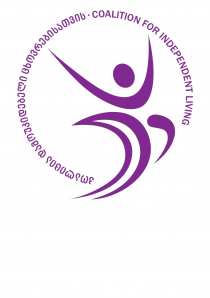
Coalition for Independent Living About the Law on the Rights of Persons with Disabilities
The Coalition for Independent Living is responding to the publication and entry into force of the Law of Georgia on the Rights of Persons with Disabilities.
The Coalition Board believes that a document of historic importance has been adopted, which will substantially improve the existence and legal status of persons with disabilities. It will even be an effective lever for NGOs and activists to successfully advocate for the community.
Adoption of the law is the result of many years of effort, which was preceded years ago by the initial version of a bill prepared with the support of the United States Agency for International Development (USAID). However, this document was not supported by the government at that time due to various objective or subjective views.
After a long pause, at the initiative of the Ministry of Justice of Georgia, based on the Convention on the Rights of Persons with Disabilities and with the involvement of the non-governmental sector, work on the bill was resumed.
The document underwent fundamental changes, in addition to reflecting a number of important aspects that introduce new obligations and concepts, such as reasonable fit, universal design, the most important and unprecedented mechanism - the special plaintiff, etc.
The law obliges the Government of Georgia to establish a body responsible for the implementation of the UN Convention on the Rights of Persons with Disabilities and to introduce a biopsychosocial model of disability assessment instead of the current medical model (although we do not agree with the timing and believe that it can be significantly reduced).
The law recognizes the Georgian sign language as one of the means of communication and education with deaf and hard of hearing people living in Georgia and obliges the state to create all the necessary conditions for its use and development.
We would like to mention here that the bill has been hotly debated many times, many remarks and recommendations have been submitted by various non-governmental organizations, a significant part of which was reflected in the final document.
However, we also share the assessment that some important recommendations, issues and proposed deadlines have not been taken into account, which can be considered as a shortcoming of the law, which needs to be amended in the by-laws and is the subject of further work.
It is important to keep in mind that no matter how ideal the law may be, without the efforts of relevant agencies and stakeholders, it will be impossible to enforce it effectively. The law published today also requires teamwork and concerted efforts to implement it effectively.
We express our readiness to cooperate with fellow organizations and all stakeholders in creating by-laws and enforcing the law effectively.
We invite all stakeholders to come together for the common good. After a certain period of time after the entry into force of the law, the weaknesses and strengths of the law will be better identified, which will allow us to prepare further legislative changes that are thoughtful and tailored to the needs.
Once again we would like to thank all the people and organizations involved in the above processes who have contributed to the improvement of the bill and its adoption.
